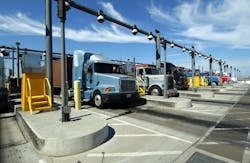ATA scores in drayage court fight with Port of LA
The American Trucking Assns. (ATA) has won part of its long legal battle with the Port of Los Angeles over drayage-truck operations there.
The U.S. Supreme Court ruled unanimously yesterday that port truckers there do not have to secure off-site parking (when not in service) nor affix reporting placards (providing the public with a number to phone in environmental or safety concerns about the truckers) on their trucks for them to operate in and out of the Port. Truckers violating those rules were subject to criminal penalties.
However, yesterday’s unanimous ruling did not address the Port’s enforcement of two other violations of its Clean Trucks Program. Those specifically address the financial capability of the motor carriers as well their truck-maintenance requirements. The court chose to send the enforcement issue back to the lower courts for further review.
Back in 2008, ATA sued the City of Los Angeles, which operates the Port, to overturn the Clean Truck Program that had been enacted ostensibly to reduce to pollution at port facilities. The program aimed to do that by restricting the types of trucks that carried goods to and from the port, as outlined in an LATimes.com news report.
To operate at the Port, the Clean Truck Program requires port truckers to abide by a concession agreement that includes the four aforementioned requirements and their enforcement.
Justice Elena Kagan, who authored the court’s opinion, wrote that regarding the parking and placarding requirements, the Port had “not acted as [it had argued it did] as a private party, contracting in a way that the owner of an ordinary commercial enterprise could mimic.
The court’s opinion was based on its finding that the parking and placarding rules were an act of regulatory authority that is not allowed under the Federal Aviation Administration Authorization Act.
“Rather,” Kagan pointed out, “it [the Port] has forced terminal operators-- and through them, trucking companies-- to alter their conduct by implementing a criminal prohibition punishable by time in prison…. Slice it or dice it any which way, the port thus acted with the force of law,” Kagan asserted.
“We are gratified that, at the conclusion of many years of litigation, the highest court in the land unanimously agreed with ATA on these rules," said ATA president & CEO Bill Graves in a statement
"Our position has always been that the Port’s attempt to regulate drayage operators - in ways that had nothing to do with its efforts to improve air quality at the port-- was inconsistent with Congress’ command that the trucking industry be shaped by market forces, rather than an incompatible patchwork of state and local regulations,” Graves added.
As of Thursday, officials with both the Port and the City of Los Angeles were reviewing the ruling to determine how it would affect operations, according to the LATimes.com report.
